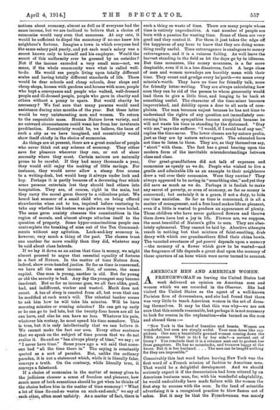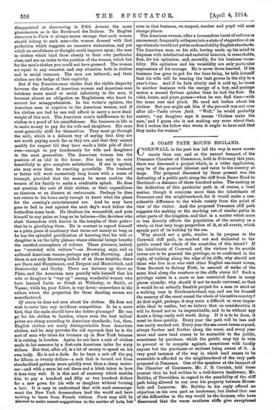AMERICAN MEN AND AMERICAN WOMEN.
.21L.FRENCHWOMAN on leaving the United States hat week delivered an opinion on American men and women which we see recorded in the Observer. She had visited the United States as the agent of a well-known Parisian firm of dressmakers, and she had found that there was very little to teach American women in the art of dress- ing themselves. It may be that this was why—we are not sure that this sounds reasonable, but perhaps it is not necessary to look for reason in the explanation—she turned on the men and abused them "Now York is the land of beauties and beasts. Women are wonderful, but men are simply awful. Your men dress like rag- pickers. One sees a beautifully gowned woman coming down the Fifth Avenue. What is act by her side P—a servant out of livery ? You conclude that it is a retainer sent out to protect her from gangsters. He has no moustache, and trousers baggy at the knees. But it is her husband. . . , The men can be taught nothing for they are impossible."
Conceivably this last word before leaving New York was the first word of a French mission of fashion to American men. That would be a delightful development. And we should seriously expect it if the denunciation bad been uttered by an American business man, for, with his wonderful adaptability, he would undoubtedly have made failure with the women the first step to success with the men. In the land of scientific' advertising it is a recognized practice to blow flames out of ashes. But it may be that the Frenchwoman was mare)/
disappointed at discovering in Fifth Avenue the same phenomenon as in the Boulevard des Italiens. To English observers in Paris it always seems strange that such women should belong to such men—the women dressed with that perfection which suggests no excessive elaboration, and yet which no carefulness or thought could improve upon; the men in clothes which bind them closely to their own particular class, and are an index to the position of the women, which but for the men's clothes you could not have guessed. The women are equal to any occasion and any situation both in clothes and in social resource. The men are tethered; and their clothes are the badge of their captivity.
But if the Frenchwoman thinks that the visible disparity between the clothes of American women and American men betokens some moral or social inferiority in the men, it becomes almost an obligation on Englishmen who know to correct her misapprehension. In the writer's opinion, the American man is superior to the American woman, and if his clothes are bad he can well afford to carry a mere dead- weight of this sort. The American man's indifference to his clothes is a proof of his unselfishness. His business in life is to make money to pay for his wife and daughters. His sons must generally shift for themselves. They must go through the mill; which is a delicate way of saying that they are not worth paying much for as they are, and that they cannot qualify for respect till they have made a little pile of their own—enough to pay handsomely for wife and daughters in the neat generation. The American woman has the position of an idol in the house. She has only to exist beautifully to give complete satisfaction. If she is spoiled, she may even then be exacting gracefully. The husband or father will work excessively long hours with a sense of triumph, provided that the money he earns enables the women of his family to make a creditable splash. He does not question the coat of their clothes, or their expenditure on theatres or on dinners at restaurants. Perhaps he does not return to his home early enough to know what the plans for the evening's entertainment are. And he may have gone to bed to rest against the next day's work before the butterflies come back. He idealizes his womenfolk, and puts himself to any pains so long as he believes—like devotees who slash themselves with knives in the temples of their gods— that he is glorifying them. He is content to regard himself as a plain piece of machinery that turns out money so long as he has the splendid gratification of knowing that his wife or daughter is on the lofty plateau where ethereal beings breathe the rarefied atmosphere of culture. These plateaux, indeed, are "crowded with culture "—as Browning says, and as cultured American women perhaps say with Browning. And there is not only Browning talked of at those heights; there are Ibsen and Hauptman, and Bergson and Maeterlinck, and Dostoieveky and Gorky. There are lectures up there on Plato, and the American man proudly Mils himself that his wife or daughter is "way up" among wonderful women who have learned Latin or Greek at Wellesley, or Smith, or Vassar, while be, poor fellow, is way down—somewhere in the cellars where the properties for these dazzling scenes are manufactured.
Of course he does not care about his clothes. He does not wish to enter into any invidious competition. Is he a mere bird, that the male should have the better plumage P He can go for his clothes to London, where even the best tailors' prices are cheap according to American standards; but, then, English clothes are easily distinguishable from American clothes, and he may provoke the old reproach that he is the sort of man who turns his trousers np in New York because it is raining in London. Again, he can have a suit of clothes made to his measure by a first-rate American tailor for sixty dollars. But that, after all, is a lot of money to spend on his own body. He is not a dude. So he buys a suit off the peg for fifteen or twenty dollars—a suit that is turned out from standardized patterns more quickly even than a cheap motor- car—and with a seam let out there and a hitch taken in here it does very well. It is this sort of economy which enables him to pay a hundred and fifty or two hundred dollars for a new gown for his wife or daughter without turning a hair. It is easy to understand that with such encourage- ment the New York dressmakers lead the world and have nothing to learn from French visitors. Paris may still be allowed to make casual suggestions in the matter of hate, but even in that business, we suspect, teacher and pupil will soon change places.
The American woman, after a tremendous burst of culture or amusement, frequently collapses into a state of stagnation at an age when she would not yet be reckonedold by English standards. The American man, on his side, having made up his mind to dispense with intellectual and sartorial honours, is remarkable, first, for his optimism, and, secondly, for his business versa- tility. His optimism and his versatility are only particular expressions of his courage. He is never down-hearted. If his business has gone to pot for the time being, he tells himself that his wife will be wearing the beat gowns in the city in a year's time. And if he fails utterly and is sold up, ho turns to another business with the energy of a boy, and perhaps makes a second fortune quicker than he lost the first. He rides, hunts, and plays games—when he can find time—with the same zest and pluck. He need not bother about his clothes. But you might ask him if the proverb was not true after all—Vesta virurn, fecal. "Well," he would probably answer, "my daughter says it means 'Clothes make the man,' and I guess she is not making any error about that. But I reckon the fellow who wrote it ought to have said that they make the woman."















































 Previous page
Previous page